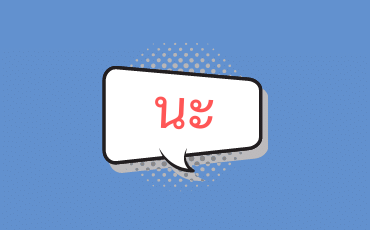If you’ve been to Thailand, you’ve definitely heard Thai people use the word นะ (náa) a lot. After reading this article, you will understand what is na in Thai, how, and when to use na.
นะ is a Thai particle that is used at the end of clauses/sentences to express:
- Please / make a sentence sound softer and less aggressive.
- Emphasis
- For confirmation
- In questions, to ask someone to repeat something
- In questions, to express shock
In this article, we will look at all 5 uses of นะ in detail. Please note, sometimes you are only able to tell which of the uses is meant using context.

1. Please
Usually when นะ means ‘please’, Thai people like to drag the sound longer. This leads to น๊าาาาา (náaaaa)
Many times it’s used with หน่อยนะ (nòi náa) to sound more polite.
Sometimes if you want to be annoying in a funny way, you can say it repeatedly many times: นะนะนะนะนะ (náa náa náa náa náa) which means please! please! please! please!
Let’s take a look at both examples.
Examples:
- I’ll go first na. We’ll see each other tomorrow na.
ไปก่อนนะ เดี๋ยวเจอกันพรุ่งนี้นะคะ
bpai gòn ná · dĭeow jer gan prûng-née ná ká - Wait in front of the door na (na here makes the command softer). I’ll come out shortly.
คุณรอที่หน้าประตูนะ เดี๋ยวฉันจะตามออกไป
kun ror têe nâa bprà-dtoo ná · dĭeow chăn jà dtaam òk bpai - Hey boyfriend, can you help carry my things please naaa, help pleaseeee naaa~
แฟนจ๋า ช่วยถือของให้หน่อยน๊าาาา ช่วยหน่อยน๊าาา
faen jăa · chûay tĕu kŏng hâi nòi náa · chûay nòi náa - When the customer comes, please call me na.
เวลาลูกค้ามา โทรหาฉันหน่อยนะ
way-laa lôok káa maa · toh hăa chăn nòi ná - Mom, can I have some money please naaa. Just one hundred baht.
แม่ ขอเงินหน่อยน๊าาาาา นะนะนะ แค่ร้อยบาท
mâe · kŏr ngern nòi náa · ná ná ná · kâe rói bàat
2. Emphasis
When นะ is used as emphasis, sometimes we add นะสิ (ná sì) instead of just นะ. Having สิ (sì) adds to the strength of the emphasis to the point that it can sometimes be sarcastic.
Examples:
- That time na (emphasizing “that time”) that you told me, I was so shocked!
ตอนนั้นนะที่เธอบอกฉัน · ฉันตกใจมากเลย
dton-nán ná têe ter bòk chăn · chăn dtòk jai mâak loie - It’s you naa (emphasizing “was it really you”)?!? You did it for me? I don’t believe you.
เธอนะหรอ · ทำแบบนี้เพื่อฉัน · ไม่เชื่อหรอก
ter ná rŏr · tam bàep née pêua chăn · mâi chêua ròk - Yeah, you’re right na si (adds sarcasm). You are the greatest, you are the best.
ใช่นะสิ เธอเก่งที่สุด เธอดีที่สุด
châi ná sì · ter gàyng têe sùt · ter dee têe sùt - Do you know whose birthday it is today?
วันนี้วันเกิดใคร รู้ไหม
wan née wan gèrt krai · róo măi
Whose birthday?
วันเกิดใครหรอ
wan gèrt krai rŏr
It’s my birthday na si (strong emphasis)! You didn’t remember?
ก็วันเกิดฉันนะสิ เธอจำไม่ได้หรอ
gôr wan gèrt chăn ná sì · ter jam mâi dâi rŏr
3. For confirmation
นะ can be used when you want someone to confirm/agree with something you just said.
Let’s see some examples:
Examples:
- Are you sure na? (you want to confirm that they are actually sure)
คุณแน่ใจนะ
kun nâe jai ná - That woman is pretty right na? (you know she is pretty and just want confirmation)
ผู้หญิงคนนั้นสวยนะ
pôo-yĭng-kon-nán-sŭay ná
4. In questions, to ask someone to repeat something
All question words in Thai can be followed by นะ when you want to ask someone to repeat something.
For example, if someone tells you to go somewhere and you didn’t hear, you can respond where na (ที่ไหนนะ)?
Examples
- What time na? (you want the speaker to repeat the time)
กี่โมงนะ
gèe mohng ná - What na? (say what?)
อะไรนะ
à-rai ná
5. In questions, to express shock
Question words in Thai can also be followed by นะ when you want to express shock.
Example:
- We will meet up tomorrow at 6am na
พรุ่งนี้เจอกัน6 โมงนะ
prûng-née jer gan hòk mohng ná
What time again!?!?! At 6 am I’m not even awake yet.
กี่โมงนะ (na = shocked that its so early!) 6 โมงฉันยังไม่ตื่นเลย
gèe mohng ná hòk mohng chăn yang mâi dtèun loie
I hope you now know how to use na in your everyday conversations. This is a particle you will hear often, so go ahead and practice!

